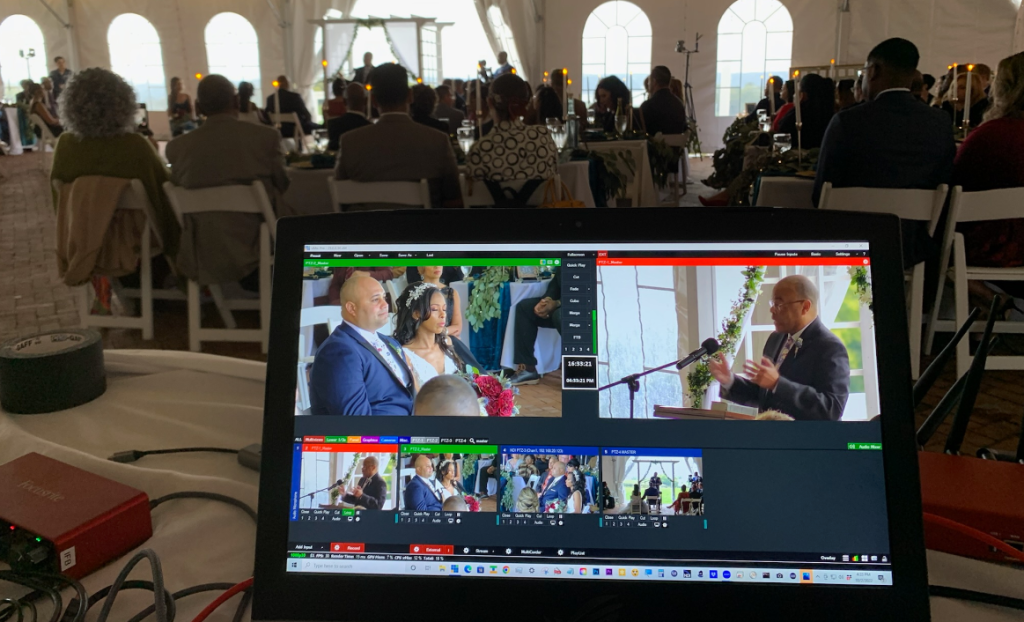Virtual Event Logistics in Kenya
Table of Contents
ToggleVirtual Event Logistics in Kenya – Deliver Seamless Online Experiences with Peak Audio

Virtual Event Logistics in Kenya
In recent years, virtual events have emerged as a vital part of Kenya’s business, education, and nonprofit ecosystems. From webinars and online trainings to hybrid conferences and remote fundraising galas, organizations across the country are embracing digital platforms to connect with audiences efficiently and cost-effectively. This shift has been fueled by increased internet access, the rise of remote work, and a growing need for flexible engagement methods.
However, virtual events come with their own set of logistical challenges that differ greatly from traditional in-person gatherings. Organizers must navigate platform selection, streaming quality, audience interaction tools, and data privacy—all while ensuring a seamless experience for both speakers and attendees. Unlike physical venues, virtual spaces demand a higher focus on technical reliability, clear communication, and contingency planning.
This is where expert virtual event logistics make all the difference. With the right AV support team, event hosts can guarantee a polished, engaging, and professionally delivered experience. From real-time troubleshooting and audience engagement features to post-event analytics, expert support transforms a basic online meeting into a dynamic and memorable event that reflects the professionalism of your brand or organization.
1. What Are Virtual Event Logistics?
Virtual event logistics encompass the careful planning, coordination, and management of all technical and operational aspects required to deliver a seamless and impactful online event experience. It involves everything from ensuring that speakers are well-prepared to making sure that the technology functions smoothly for both presenters and attendees. Virtual event logistics are crucial for creating a flawless event that runs efficiently and meets the expectations of all participants.
1.1 Coordinating All Technical and Operational Elements for Smooth Online Event Execution

Virtual Event Logistics in Kenya
Effective coordination is the backbone of successful virtual events. All elements must be organized to work in harmony for the event to run smoothly.
-
Comprehensive Planning of Tech Requirements
A well-executed virtual event depends heavily on technical infrastructure. From video streaming platforms to audio equipment, every component needs to be in place and functional before the event begins. This means choosing the right software, ensuring all platforms are properly integrated, and ensuring the necessary hardware is on standby in case of failure. -
Coordinating with Various Stakeholders
Virtual event logistics involve not just technical teams but also external stakeholders like event organizers, vendors, speakers, and attendees. Coordinating schedules, availability, and delivery for all these parties ensures that the event remains on track. Clear communication is essential for troubleshooting issues and ensuring everyone knows their role in the lead-up to and during the event. -
Real-Time Monitoring During the Event
Once the event begins, it is crucial to monitor every aspect of the production. This includes overseeing live streams, ensuring that there are no issues with audio-video synchronization, checking that speakers and attendees are engaged, and troubleshooting any technical problems that arise in real-time. -
Post-Event Follow-Up and Analysis
After the event, the logistics team assesses the effectiveness of the virtual platform, feedback from attendees, and any technical issues that were encountered. By analyzing these elements, event planners can better understand what worked and what needs improvement for future events.
1.2 Ensuring Speaker Readiness, Audience Access, and Technical Reliability

Virtual Event Logistics in Kenya
When it comes to virtual events, the technical readiness of speakers, ease of access for the audience, and consistent reliability are crucial elements that define the success of the event.
-
Speaker Preparation and Technical Checks
For virtual events to run smoothly, it’s essential to prepare speakers well ahead of time. This includes ensuring their audio-video setup is optimized and providing them with necessary training on using the virtual platform. Technical rehearsals should be conducted with all speakers to test microphone clarity, camera angles, and screen sharing functionality. -
Audience Access and Registration Management
Ensuring easy access for the audience is another critical aspect of logistics. This involves setting up secure, easy-to-use registration systems and providing clear instructions for accessing the event platform. Links, access codes, and any necessary software downloads should be shared in advance to avoid confusion and delays on the event day. -
Network and Platform Reliability
The technology used to host a virtual event must be reliable. This means selecting a stable platform with high availability and sufficient bandwidth to handle large crowds. Event logistics ensure that technical support is available throughout the event to manage connectivity issues, audio interruptions, or any platform errors that might arise. -
Engagement Tools for Attendees
Another important aspect is integrating engagement tools into the event. These might include chat features, polling options, and Q&A sessions that allow the audience to interact with speakers or moderators. These tools improve attendee participation, ensuring they remain engaged and involved in the event’s flow.
1.3 The Key Difference Between Event Hosting and Event Logistics

Virtual Event Logistics in Kenya
While event hosting and event logistics are closely related, they serve distinct functions in the virtual event space.
-
Event Hosting: The Experience
Event hosting focuses on the content delivery and the live experience of the event. This involves managing speakers, presentations, and moderating discussions, creating the atmosphere, and ensuring the event progresses smoothly. The focus is primarily on the interaction between the host, speakers, and audience during the event. -
Event Logistics: The Infrastructure
Event logistics, on the other hand, is all about the behind-the-scenes preparation and coordination that ensures the event can happen without technical hitches. It involves organizing the platforms, ensuring the necessary equipment is in place, preparing the speakers, and making sure the audience has the resources they need to access and participate in the event. Logistics ensure the practical elements are aligned with the goals of the event. -
Seamless Integration of Both
For an event to be truly successful, the hosting team and logistics team must work in tandem. The event hosting focuses on delivering content and fostering engagement, while logistics ensure that the technology, schedules, and operational procedures are set up to facilitate a flawless execution. -
Minimizing Disruptions
The biggest difference lies in minimizing disruptions. Event logistics are key to ensuring that technical issues, such as poor connectivity or late speaker arrivals, are handled efficiently before or during the event. The hosting team ensures the message and content are delivered smoothly once those logistical aspects are under control.
Virtual event logistics are critical to the success of online conferences, webinars, and other digital events. By carefully coordinating all technical and operational elements, ensuring speaker and audience readiness, and distinguishing between the roles of hosting and logistics, event organizers can deliver seamless, impactful virtual experiences. Peak Audio’s expert logistical management ensures that every aspect of your virtual event runs without a hitch, from start to finish.
2. Core Components of Virtual Event Logistics
Virtual event logistics are critical to delivering smooth, seamless experiences for both speakers and attendees. The key components of virtual event logistics cover the platform setup, speaker management, audience engagement, technical support, and content management. Each of these components plays a crucial role in ensuring that the event runs as planned without any technical hiccups or interruptions.
2.1 Platform Selection and Setup

Virtual Event Logistics in Kenya
Selecting the right platform is fundamental to the success of a virtual event. The platform acts as the foundation for all the event’s logistics and determines the technical functionality and attendee experience.
-
Choosing the Right Platform for Your Event
Different platforms offer varying features, which is why platform selection depends on the type of event you’re hosting. For example, Zoom is ideal for webinars and large meetings, while platforms like Microsoft Teams or Google Meet are more suited for corporate meetings with integrated document sharing. For more immersive virtual events, Hopin, Airmeet, and Whova provide dedicated event-specific features like virtual exhibit halls, networking lounges, and interactive sessions. -
Customizing Registration Forms and Attendee Roles
Once a platform is chosen, the next step is to customize the registration process. This involves setting up custom registration forms that collect essential information from attendees such as names, email addresses, and organization details. Additionally, platforms allow for assigning roles such as panelists, moderators, and attendees, ensuring smooth management and access control throughout the event. -
Branding the Virtual Experience
Virtual events offer great opportunities to reinforce your brand identity. By customizing logos, banners, waiting rooms, and interface colors, you can create a cohesive, branded event environment. This helps in providing a professional and consistent look to your attendees while maintaining the theme of your event. -
Seamless User Interface
Making sure the platform interface is user-friendly and easy to navigate is crucial. A clutter-free and intuitive design will help participants focus on the content rather than dealing with technical issues. The user interface should also be consistent with your branding to maintain a polished event experience.
2.2 Speaker and Presenter Management

Virtual Event Logistics in Kenya
Managing speakers and presenters is one of the most important logistical tasks for virtual events. Ensuring their preparedness, proper technology setup, and smooth transitions during the event is essential for maintaining audience engagement.
-
Pre-event Training and Rehearsals
To avoid any hiccups, organizing training sessions and rehearsals with your speakers is a must. This ensures they are familiar with the platform, know how to share their screens, adjust their microphones, and operate other tools effectively. By going through the entire event flow during rehearsals, speakers can feel confident and prepared. -
Tech Checks for Webcams, Microphones, and Stable Internet
Technical preparation is key to avoid disruptions during the event. Webcams, microphones, and a stable internet connection are essential for clear communication. Performing a tech check beforehand ensures that speakers’ visuals and audio are crisp and free of distractions. Troubleshooting and resolving any potential issues before the event is vital to the success of the presentation. -
Real-time Moderation Support and Speaker Transitions
During the event, moderators play a pivotal role in managing transitions between speakers. Having a dedicated team to handle transitions between live presenters, Q&A sessions, and pre-recorded content ensures a seamless experience. Moderators also provide real-time support, like muting/unmuting speakers or addressing issues like microphone feedback. -
Audience Interaction with Speakers
Ensuring that speakers are able to interact with the audience is crucial for engagement. Q&A sessions, live polls, and chat moderation help facilitate meaningful exchanges between the speaker and audience, making the event more interactive.
2.3 Audience Engagement Tools

Virtual Event Logistics in Kenya
Audience engagement is crucial for the success of a virtual event. Keeping attendees involved and interested throughout the event is key to ensuring its success.
-
Polls, Q&A Modules, and Real-Time Chat Moderation
Tools such as live polls, Q&A modules, and real-time chat allow attendees to participate actively during the event. These tools help in gauging audience sentiment, answering questions in real-time, and maintaining a lively conversation. A dedicated moderator can manage the chat, ensuring that it remains focused and productive. -
Interactive Whiteboards, Screen Sharing, and Breakout Sessions
To enhance engagement further, platforms offer interactive features like whiteboards where speakers can write or sketch ideas in real-time. Screen sharing and breakout sessions allow for smaller group discussions and deep dives into topics, offering a more interactive, personalized experience for attendees. -
Attendance Tracking and Participant Feedback Collection
Virtual events allow event planners to track attendance and engagement metrics through the platform’s analytics tools. Additionally, post-event surveys and feedback collection tools can help you measure the success of the event and gather insights into areas for improvement in future events. -
Gamification and Rewards
To keep the audience entertained, gamification tools like leaderboards, quiz challenges, and virtual rewards can be used to boost interaction. This approach helps maintain energy levels during long events and encourages active participation.
2.4 Technical Support and Troubleshooting

Virtual Event Logistics in Kenya
Technical support is the backbone of a virtual event’s logistics. Ensuring that both speakers and attendees have access to reliable support throughout the event is key to preventing disruptions.
-
Live Support for Speakers and Attendees
A dedicated technical support team must be available at all times during the event to address any issues that arise. This includes troubleshooting audio or video problems, helping late speakers get connected, or assisting attendees who are having trouble logging in or accessing content. -
Backup Systems for Internet, Power, and Hardware
Having backup systems in place is essential for any virtual event. This includes backup internet connections, power sources, and critical hardware like cameras, microphones, and computers. In case of a failure, these systems ensure the event continues without interruptions. -
Managing Latency, Lag, Audio Issues, or Login Problems
Virtual events are often affected by latency or lag, which can cause delays between the speaker’s actions and the audience’s viewing experience. It is important to address these technical issues proactively, ensuring that the streaming quality is optimized for different bandwidths. Having a team monitor and resolve these issues as they arise is essential for smooth delivery. -
Troubleshooting Platform Errors
Platforms occasionally experience errors or bugs, which can interrupt sessions. Having a technical support team on standby, ready to troubleshoot and solve any platform-related issues, ensures that disruptions are minimal and the event proceeds without major setbacks.
2.5 Content Management and Streaming

Virtual Event Logistics in Kenya
Content management is key to delivering a polished and professional virtual event. It involves mixing pre-recorded content with live sessions, managing streaming, and handling post-event media.
-
Pre-recorded Content Mixing with Live Sessions
A well-executed virtual event may include a combination of live presentations and pre-recorded videos. Mixing both ensures a smoother experience for the audience, as it reduces the risk of technical glitches. Carefully timed transitions between live and pre-recorded content keep the event flowing seamlessly. -
Livestreaming to YouTube, Facebook Live, or Private Portals
Streaming the event to platforms like YouTube, Facebook Live, or private portals allows you to reach a broader audience. Using high-quality streaming solutions ensures that both audio and video remain clear, regardless of the platform. -
Event Recording and Post-event Video Editing
After the event, content can be recorded for future access. This content can be edited and re-shared for on-demand viewing, giving attendees an opportunity to review sessions they may have missed. Proper editing ensures that only the most relevant and high-quality portions of the event are available for future viewing. -
Archiving and Storage
Storing event recordings and materials securely is vital for future access and reference. Using cloud storage services with strong security protocols ensures the safety and availability of event content for later review or marketing purposes.
Managing virtual event logistics is an essential aspect of delivering an event that engages and impresses your audience. From platform selection and speaker management to audience engagement and content streaming, each logistical element must be handled with care to ensure a flawless experience. With careful planning, expert technical support, and effective tools, virtual events can achieve their full potential and leave a lasting impact on attendees. By addressing these core components, organizers can create an unforgettable and seamless event experience.
3. Virtual Event Planning Workflow

Virtual Event Logistics in Kenya
Planning a virtual event involves a series of well-coordinated steps to ensure the event runs smoothly from beginning to end. The workflow is divided into three major stages: Pre-event planning, Event day coordination, and Post-event activities. These stages ensure that the event is well-organized and delivers a high-quality experience to both speakers and attendees.
3.1 Pre-Event Planning
Pre-event planning is a critical phase in virtual event logistics. It involves understanding your event’s needs, selecting the right platform, and ensuring everything is set up for a seamless experience on event day.
-
Needs Assessment and Platform Selection
Understanding the specific needs of your event is the first step in pre-event planning. Whether it’s a webinar, conference, or product launch, assessing the requirements of the event helps in selecting the most suitable platform. For instance, Zoom might be ideal for webinars, while a more interactive platform like Hopin may be better for large-scale conferences. Consider factors like audience size, interactivity, branding opportunities, and technical features to choose the right one. -
Scheduling and Registration Setup
Once the platform is chosen, it’s time to set up the event schedule. Create detailed schedules for speakers and sessions, along with the registration system. Customize the registration process with specific questions relevant to the event. Allow for automated reminders and updates to ensure attendees are informed about the event’s time and agenda. Registration details should be clear and easy to follow. -
Tech Run-throughs and Test Events
To avoid technical issues during the live event, it’s essential to conduct test events and tech run-throughs. These run-throughs help ensure that speakers are familiar with the platform, understand how to manage their audio/video settings, and can share content like presentations. It’s also an opportunity to test the internet connection and troubleshoot any issues with platform features, like breakout rooms or live streaming.
3.2 Event Day Coordination
Effective event day coordination is crucial for the success of a virtual event. This stage ensures that everything goes as planned, and technical support is available in case of any problems.
-
Virtual Backstage Coordination (Speaker Check-ins, Transitions)
The backstage area refers to the behind-the-scenes coordination of speakers and presenters. Ensuring that speakers check in early for tech checks and that transitions between speakers run smoothly is essential. Backstage staff should communicate with speakers to ensure they are ready and provide any assistance needed, such as muting/unmuting or screen-sharing support. -
Attendee Communication (Email, SMS Reminders, Live Chat)
Attendee communication is key to maintaining engagement. Pre-event email and SMS reminders ensure attendees remember the event time and know where to log in. During the event, real-time communication via live chat can be used to address attendee questions or issues. Keep the communication clear and frequent to avoid confusion or frustration. -
Real-time Support Desk for Troubleshooting
Having a real-time support desk available for both speakers and attendees is crucial. This desk helps solve any problems that arise with connectivity, audio issues, or login problems. It should be staffed by technicians who are experienced in troubleshooting common virtual event issues and can guide participants through solutions quickly.
3.3 Post-Event Activities
Once the event concludes, post-event activities help to analyze the success of the event, gather feedback, and provide attendees with access to event content.
-
Data and Analytics Collection (Attendance, Engagement Metrics)
After the event, collect and analyze data from the event platform. This includes metrics such as attendance rates, engagement levels (how long attendees stayed, which sessions they attended), and how interactive the audience was (poll responses, chat participation). These insights are essential for understanding the success of the event and improving future events. -
Survey Deployment and Feedback Review
Deploying a post-event survey to attendees helps gather qualitative feedback on their experience. This feedback can address everything from event content and speaker quality to platform usability. Reviewing the feedback allows event organizers to identify areas for improvement and celebrate successes. -
Content Archiving and Sharing (Video Recordings, Transcripts, Slides)
Archiving the event content is important for providing access to attendees who missed the live event or for future reference. This includes recorded video sessions, transcripts, and slides. These can be uploaded to a private portal, or shared via email, so attendees can revisit key information. This content can also be repurposed for marketing or as a resource for future events.
A well-executed virtual event requires careful planning, precise coordination on the event day, and thorough post-event analysis. By focusing on pre-event planning, event day logistics, and post-event follow-up, organizers can create seamless virtual experiences that engage their audiences and deliver valuable insights. With the right preparation, technical support, and content sharing strategies, virtual events can leave a lasting impact and improve with each iteration.
4. Tools & Technologies We Use
At Peak Audio, we leverage a comprehensive set of tools and technologies to ensure the seamless execution of your virtual events. These technologies enable us to deliver high-quality experiences, from event hosting and audience engagement to production quality and team coordination. Here’s a breakdown of the key tools and technologies we use to enhance event success:
4.1 Event Hosting Platforms

Virtual Event Logistics in Kenya
Choosing the right platform is essential for a successful virtual event. We work with a variety of event hosting platforms, each offering unique features to match your event’s needs.
-
Zoom Webinar
Widely recognized for its stability and ease of use, Zoom Webinar allows for large-scale events with high participant engagement. It offers features like breakout rooms, live polls, and Q&A to create a dynamic environment for attendees. -
Microsoft Teams
Ideal for corporate or business-related events, Microsoft Teams integrates seamlessly with Microsoft 365, making it an excellent choice for webinars and meetings that require collaboration on documents and other resources. -
Hopin
Hopin is a versatile platform designed for large-scale virtual events. It offers a virtual venue where attendees can explore multiple sessions, network, and engage in interactive experiences. This platform is ideal for conferences, expos, and hybrid events. -
Whova
Best for conferences and trade shows, Whova enables attendees to access session agendas, speaker information, and networking opportunities. It is highly customizable, allowing for tailored event experiences that are both interactive and user-friendly. -
Airmeet
Known for its engaging networking features, Airmeet provides a dynamic experience with virtual lounges, roundtable discussions, and live interactions. It’s perfect for events focused on networking and fostering attendee interaction.
4.2 Audience Engagement Add-ons

Virtual Event Logistics in Kenya
To create interactive and engaging virtual experiences, we integrate audience engagement tools that encourage participation and feedback throughout the event.
-
Slido
Slido is a powerful tool for enhancing audience interaction during live events. It offers features like live polls, Q&A, and quizzes that help keep attendees engaged and provide real-time insights into their opinions. -
Mentimeter
Mentimeter allows event hosts to create interactive presentations using live polling, word clouds, quizzes, and more. It’s an ideal way to make your sessions more interactive and capture audience attention. -
Kahoot
Ideal for gamification, Kahoot makes events fun and engaging by allowing attendees to participate in quizzes and games. It’s particularly effective in keeping energy levels high during longer events or breaks. -
Google Forms
For post-event feedback or gathering information, Google Forms offers an easy and effective way to capture surveys, polls, and registration information. It integrates well with other tools and is simple to distribute to attendees.
4.3 Production Tools

Virtual Event Logistics in Kenya
For high-quality production, we use a range of tools and technologies that ensure seamless transitions, clear visuals, and immersive content delivery.
-
OBS Studio
OBS Studio is an open-source video recording and live streaming tool that offers advanced features like scene transitions, overlay integration, and custom branding. It’s the perfect tool for professional-grade event streaming. -
vMix
vMix allows for live switching between multiple video inputs, making it ideal for events with several speakers or presentations. It’s used for HD video production, live streaming, and broadcasting with integrated graphics and multi-camera support. -
StreamYard
StreamYard is a browser-based streaming tool that lets event organizers produce professional live broadcasts with overlays, custom logos, and branding. It’s particularly useful for streaming events to platforms like YouTube, Facebook Live, or a custom site. -
External Cameras, Lighting, Microphones, and Green Screens
We also use high-quality external cameras, professional lighting setups, and premium microphones to ensure a polished and professional virtual event production. Green screens are used for virtual backgrounds, enhancing the overall aesthetic and creating immersive environments for events.
4.4 Communication and Management Tools

Virtual Event Logistics in Kenya
Effective communication and project management tools are essential for ensuring smooth event execution. These tools facilitate real-time collaboration, task management, and communication throughout the planning and execution phases.
-
Trello
Trello is a task management tool that helps us organize event logistics, from scheduling speakers to tracking event tasks. It provides an easy-to-use visual board to monitor progress and assign responsibilities. -
Asana
Asana is another powerful project management tool used to break down complex event planning tasks into manageable steps. It allows for task assignments, deadlines, and real-time tracking, ensuring all event details are on schedule. -
Google Workspace
Google Workspace provides a suite of tools for real-time collaboration, including Google Docs, Google Sheets, and Google Drive. It allows team members to work together on documents and spreadsheets, making planning more efficient. -
WhatsApp
For quick communication and real-time coordination, WhatsApp is used by our team to stay connected throughout the event. It ensures that any issues can be resolved immediately, and urgent information can be shared with the team promptly. -
Slack
Slack is a messaging platform used for team collaboration, especially during events. It enables channel-based communication, allowing specific teams (e.g., tech support, speakers, coordinators) to communicate in dedicated spaces for better organization.
The tools and technologies we use at Peak Audio are designed to ensure every aspect of your event, from platform hosting to audience engagement, runs smoothly. With cutting-edge production tools, effective communication solutions, and a variety of platform options, we are equipped to deliver top-notch virtual events that provide engaging experiences for your attendees and seamless logistics for your team. Our comprehensive approach guarantees a well-executed event, no matter the scale or complexity.
5. Common Challenges in Virtual Events – And How We Solve Them

Virtual Event Logistics in Kenya
Virtual events present unique challenges, from technical glitches to audience engagement issues. However, with the right tools, preparation, and quick-thinking, these obstacles can be managed effectively. At Peak Audio, we’ve identified the most common challenges faced during virtual events and outlined solutions to ensure seamless event execution.
5.1 Internet Instability or Power Blackouts
Internet instability and power blackouts can disrupt virtual events, causing connectivity issues and interruptions in the flow of sessions. To prevent these problems from impacting your event, we implement the following solutions:
-
Backup Wi-Fi and Power Sources
We ensure that our backup internet connections (such as mobile hotspots) are available in case the primary connection fails. Additionally, generators and UPS (Uninterruptible Power Supply) systems are always on standby to ensure there is no power interruption during critical moments of the event. -
Hybrid Hosting (Remote + On-Location Command Center)
To further mitigate the risk of technical failures, we often set up hybrid hosting. This means having both remote and on-location command centers. This provides redundancy in case one location experiences issues, ensuring that the event continues without disruption.
5.2 Speaker Tech Issues
Speakers are often at the heart of virtual events, but tech issues such as audio problems, camera failures, or platform glitches can occur. Here’s how we tackle speaker-related tech challenges:
-
Pre-Event Tech Rehearsals
Tech rehearsals before the event are mandatory. We conduct multiple test runs with speakers to ensure their audio, video, and internet connection are stable. This includes checking microphones, webcams, screen-sharing settings, and presentation slides. -
On-Call Technical Support Team During the Session
A dedicated technical support team is available throughout the event to assist speakers with any issues in real-time. Whether it’s troubleshooting a connection problem or fixing audio issues, our team is always ready to intervene and ensure smooth transitions.
5.3 Audience Drop-Off or Low Engagement
Virtual events can sometimes experience audience drop-off or low engagement, making it difficult to maintain attention throughout long sessions. To prevent this and ensure active participation, we use the following strategies:
-
Strategic Placement of Polls, Breaks, and Interactive Content
We strategically time polls, interactive questions, and short breaks during the event to keep the audience engaged. These engagement points help break up long sessions and create moments of interaction, ensuring the audience remains focused and involved. -
Post-Event Q&A or Networking Rooms
After the event, we offer post-event Q&A sessions or virtual networking rooms where attendees can interact with speakers and other participants. This provides an additional layer of engagement and allows attendees to connect, ask questions, and continue their involvement with the event content.
5.4 Platform Glitches or Crashes
Even the most reliable platforms can experience glitches or crashes during high-traffic events. To address these issues proactively, we employ the following tactics:
-
Platform Load Testing
Before the event, we perform load testing on the chosen platform to simulate real-time user traffic. This helps ensure that the platform can handle the expected number of attendees without issues like lag, crashes, or delays. -
Plan B: Mirror Stream or Quick-Switch Platform Ready
We always have a backup plan in case the platform faces issues. A mirror stream or alternative platform is ready to go, allowing us to quick-switch and continue the event without causing major disruptions. This ensures that if there are technical difficulties, the audience’s experience remains unaffected.
Virtual events come with their own set of challenges, but with advanced planning, the right tools, and dedicated support, these obstacles can be easily overcome. By implementing backup systems, conducting tech rehearsals, offering interactive engagement, and having contingency plans in place, we ensure that every virtual event runs smoothly from start to finish. Our solutions are designed to address potential issues proactively, allowing both organizers and attendees to focus on the content and experience.
6. Why Choose Peak Audio for Virtual Event Logistics in Kenya
When it comes to virtual event logistics, Peak Audio provides comprehensive support to ensure every aspect of your event runs smoothly. From initial planning through to post-event analytics, we deliver a seamless experience with tailored solutions. Here’s why Peak Audio should be your partner for virtual events in Kenya.
6.1 End-to-End Virtual Event Support

Virtual Event Logistics in Kenya
Our end-to-end support means that we manage every part of your virtual event logistics, allowing you to focus on content and audience engagement. From the initial concept to the final post-event report, we take care of all technical, logistical, and operational details to ensure a smooth and professional event.
-
Event Conceptualization and Planning
We start by understanding your event objectives, then work with you to design the structure, platform, and interactivity features that best meet your needs. -
Full Execution Management
We handle platform setup, speaker coordination, technical rehearsals, and everything in between. Our team ensures every detail is executed seamlessly. -
Post-Event Reports and Analytics
After your event concludes, we provide detailed post-event reports that include engagement metrics, attendee feedback, and suggestions for improvement. This data helps you measure success and fine-tune future events. -
Continuous Feedback Loop
Throughout the event, we keep you informed and ensure that any adjustments are made in real time to enhance the experience for both presenters and attendees.
6.2 Technical Expertise Across Multiple Platforms

Virtual Event Logistics in Kenya
Peak Audio’s technical expertise spans all the leading virtual event platforms, so you can be sure that whatever platform you choose, we will provide expert management and execution.
-
Certified Teams Familiar with Popular Platforms
Our team members are certified in the most widely used virtual event platforms, including Zoom, Microsoft Teams, Google Meet, Hopin, Airmeet, and Whova. Whether it’s a simple webinar or a multi-session conference, we have the skills to ensure smooth platform integration. -
Versatile Platform Integration
We understand the technical intricacies of each platform and tailor our support to make sure it works seamlessly with your event goals, whether you’re hosting a webinar, conference, or panel discussion. -
Adaptability to Client Needs
We can quickly adapt to the needs of your event, whether it involves complex session structures, breakout rooms, or integrating with third-party tools like live streaming or Q&A modules. -
Real-Time Monitoring
During the event, we provide real-time platform monitoring to resolve any issues immediately and to maintain a stable experience for all participants.
6.3 Customization and Branding

Virtual Event Logistics in Kenya
Your virtual event should reflect your brand and mission. At Peak Audio, we provide full customization and branding solutions to ensure your event aligns with your company’s image and objectives.
-
Branded Registration and Waiting Rooms
We offer customized registration pages, including logos, colors, and corporate branding, ensuring a professional first impression for attendees. Similarly, waiting rooms can be tailored to include company branding and informational content. -
Themed Event Design
From the event platform interface to presentation slides and video elements, we ensure that every detail of your event is consistent with your brand’s identity. -
Interactive Branding Features
We can incorporate branded polls, Q&A sessions, and even customized virtual backgrounds for speakers and attendees, reinforcing your brand’s message throughout the event. -
Post-Event Branded Content
After the event, we can provide you with branded event recordings, highlights, and content that you can share with attendees or use for marketing purposes.
6.4 Reliable, On-Call Support Throughout

Virtual Event Logistics in Kenya
When hosting a virtual event, unexpected issues can arise at any moment. That’s why Peak Audio offers reliable, on-call support to ensure your event is always running smoothly from start to finish.
-
Dedicated Event Support Team
Our experienced team will be on-call throughout the event, offering technical support to both speakers and attendees. Whether it’s helping with screen sharing or troubleshooting issues, we’re there to assist. -
Real-Time Troubleshooting
If any technical issues arise during the event, we quickly assess and resolve them without causing significant interruptions, ensuring minimal disruption to the flow. -
Post-Event Technical Assistance
Even after the event, we offer post-event support for any queries or concerns about recordings, feedback collection, or event analytics. -
24/7 Availability for Planning and Emergencies
Our team is available round-the-clock to provide assistance during the planning phase, ensuring that all technical elements are in place, and also during the event, so you’re never left alone with a technical issue.
6.5 Affordable Packages for All Event Sizes

Virtual Event Logistics in Kenya
At Peak Audio, we understand that different events come with different budgets and requirements. That’s why we offer affordable packages that are tailored to the size and complexity of your event.
-
Scalable Solutions
From intimate workshops to large-scale conferences with 1000+ attendees, we offer scalable solutions that ensure the right level of support, technology, and logistics for your needs. -
Budget-Friendly Options
We provide cost-effective packages that meet the needs of smaller events without sacrificing quality. You can still expect premium service regardless of the event size or budget. -
Flexible Pricing Models
Our flexible pricing models allow you to choose a package based on your specific requirements, and we offer discounts for long-term or recurring event clients. -
Transparent Costing
We provide clear and upfront pricing, so there are no surprises, and you can plan your event budget with confidence.
Choosing Peak Audio for your virtual event logistics ensures that your event will run smoothly from start to finish, with a team of experts ready to support you every step of the way. We offer comprehensive solutions that encompass platform selection, technical support, custom branding, and affordable pricing, all tailored to meet the specific needs of your event. With Peak Audio, your virtual event in Kenya will be a seamless, engaging, and professional experience.
7. Types of Virtual Events We Manage
Peak Audio specializes in managing a wide variety of virtual events. Whether you’re hosting a webinar, a virtual product launch, or a hybrid event, our team is equipped with the expertise and technology to ensure seamless execution. Here’s an overview of the different types of events we manage and the services we offer for each.
7.1 Webinars and Online Workshops

Virtual Event Logistics in Kenya
Webinars and online workshops are among the most common types of virtual events, often used for educational, promotional, or training purposes. Peak Audio ensures that these events are engaging and interactive for both speakers and attendees.
-
Panel Moderation, Screen Sharing, and Q&A Control
Our team takes care of moderating panels, ensuring smooth transitions between speakers and topics. We also manage screen sharing for presentations and handle live Q&A sessions to ensure that all audience queries are answered in an organized and timely manner. -
Audience Engagement
Interactive features like polls, chat rooms, and feedback forms help keep attendees engaged throughout the event, making it more than just a one-way presentation.
7.2 Virtual AGMs and Stakeholder Meetings

Virtual Event Logistics in Kenya
Virtual AGMs (Annual General Meetings) and stakeholder meetings require extra attention to security and legal compliance to ensure that sensitive information is handled appropriately. Peak Audio specializes in creating secure and professional settings for these types of meetings.
-
Secure Access, Voting Tools, and Legal Compliance
We provide secure access to ensure that only authorized participants can join the meeting. Integrated voting tools allow shareholders or stakeholders to participate in real-time decisions, while we ensure legal compliance with data protection laws and industry standards. -
Confidentiality and Data Protection
We follow best practices for confidentiality and data protection, using encrypted platforms to safeguard all sensitive information exchanged during the meeting.
7.3 Online Trainings and E-Learning Events

Virtual Event Logistics in Kenya
Online training and e-learning events are an effective way to provide skills and knowledge to employees, students, or clients. Peak Audio delivers interactive and organized sessions that promote engagement and knowledge retention.
-
LMS Integration, Breakout Groups, and Engagement Tracking
We integrate Learning Management Systems (LMS) for seamless access to training materials and performance tracking. Additionally, we facilitate breakout sessions for smaller group discussions or hands-on activities, fostering better learning outcomes. -
Real-Time Engagement
Features like quizzes, polls, and instant feedback allow us to track attendee engagement and make real-time adjustments to ensure a dynamic learning experience.
7.4 Virtual Product Launches and Showcases

Virtual Event Logistics in Kenya
A virtual product launch or showcase can reach a wide audience and generate excitement about your brand. Peak Audio helps bring your products to life in a dynamic, interactive virtual setting.
-
Branded Visuals, Multi-Camera Setups, and Live Demos
We create branded visuals and set up multi-camera environments to give your product launch a polished, professional look. Whether it’s a live demo of your product or showcasing its features, we ensure the visual experience is clear, engaging, and aligns with your brand’s identity. -
Interactive Features
We include live chats, polls, and Q&A sessions to keep the audience engaged and answer questions as the product is being showcased.
7.5 Hybrid Events (Physical + Virtual)

Virtual Event Logistics in Kenya
Hybrid events, which combine physical and virtual elements, have become increasingly popular, especially for large conferences or corporate events. Peak Audio ensures that both in-person and virtual participants have a seamless experience.
-
Live-Streaming from a Venue with Remote Participants
We handle the live-streaming of physical events, providing professional setups to ensure high-quality video and audio for both in-person and virtual attendees. Whether it’s a keynote speech, panel discussion, or workshop, we ensure that remote participants feel as engaged as those attending in person. -
Interactive Integration
Our team integrates virtual attendees with physical attendees through live chats, Q&A, and polling, creating an immersive experience for everyone involved.
At Peak Audio, we specialize in a diverse range of virtual events, from webinars and online training sessions to hybrid events and virtual AGMs. Our expertise in event logistics, technology management, and audience engagement ensures that your event runs smoothly and delivers a professional experience for both in-person and virtual attendees. Whatever type of virtual event you’re planning, Peak Audio is ready to support you at every step to make it a success.
8. FAQs – Virtual Event Logistics in Kenya
Virtual events are now a core part of how businesses, organizations, and even governments communicate and engage audiences. At Peak Audio, we frequently receive questions about our virtual event logistics services. Below are some of the most common FAQs, answered in detail to help you better understand how we support virtual events in Kenya and beyond.
8.1 How much does virtual event logistics cost in Kenya?
The cost of virtual event logistics in Kenya can vary depending on the scope, complexity, and type of event you’re hosting.
-
Entry-level packages for small webinars or basic workshops may start from KES 20,000, covering platform setup, basic branding, and minimal support.
-
For mid-tier events with multiple sessions, breakout rooms, and engagement tools, expect to pay between KES 40,000 to KES 100,000, depending on the duration and number of attendees.
-
High-end or hybrid events involving livestreaming, multiple camera setups, simultaneous translation, or custom branding solutions can range from KES 150,000 to over KES 500,000.
-
We also offer custom pricing based on your unique needs and technical specifications. Request a quote to get started.
8.2 Can you help with just platform setup and not full hosting?
Yes. At Peak Audio, we provide modular support—which means you can hire us for only what you need.
-
We can set up your platform (Zoom, Teams, Webex, Hopin, etc.), including event links, registration forms, access controls, and branding.
-
We’ll customize waiting rooms, panel layouts, breakout rooms, and other features to suit your agenda.
-
Even if you’re handling hosting or content internally, we can remain on standby for technical backup during your event.
-
This approach is ideal for in-house communications teams or trainers who are confident in presenting but need help with the backend.
8.3 Do you offer rehearsal and speaker training sessions?
Absolutely. Speaker preparation is one of the most critical success factors for any virtual event.
-
We offer pre-event rehearsals to familiarize speakers with the platform, presentation flow, and handover cues.
-
We provide technical checks for microphones, webcams, lighting, and internet stability.
-
Our team coaches speakers on how to engage virtual audiences, such as using visual aids, body language, and speaking into the camera.
-
We also offer backstage support on event day, ensuring smooth transitions between presenters and quick tech fixes if needed.
8.4 What platforms do you support?
We support a wide variety of popular and niche virtual event platforms, tailored to your audience size, objectives, and budget.
-
Common platforms include Zoom, Microsoft Teams, Google Meet, Webex, and GoToWebinar—great for internal meetings, training, and small-scale events.
-
For more advanced experiences, we support Hopin, Airmeet, Whova, and other event-specific platforms that allow for multi-track agendas, expo booths, audience engagement, and ticketing.
-
We also assist with private portal setups, embedded livestreams on your website, or YouTube/Facebook integration.
-
Our team advises on the best platform for your goals and handles all configurations on your behalf.
8.5 Can we record the event for later viewing?
Yes. Every virtual event we manage includes the option to record and store content for future use.
-
We offer full-length recording of sessions in HD or 4K quality, depending on platform and setup.
-
Recordings can be trimmed and edited for post-event distribution—perfect for recap videos, training modules, or marketing assets.
-
We support captioning and transcription to make your recordings more accessible and searchable.
-
You can choose to host the content privately, upload it to your social media channels, or integrate it into your LMS or intranet.
Virtual event logistics go far beyond just clicking “Start Meeting.” They involve careful planning, technical setup, speaker coaching, platform mastery, and post-event content delivery. At Peak Audio, we’re here to guide you through every step—from platform selection to recording and follow-up. Whether you need full-service logistics or just a few technical essentials, our team is ready to make your virtual event a success.
Host Professional Virtual Events with Peak Audio

Virtual Event Logistics in Kenya
Hosting a professional virtual event requires more than just a video link—it demands flawless coordination, dependable technology, and expert support. At Peak Audio, we specialize in managing every logistical detail so your event runs smoothly and leaves a lasting impression on your audience.
From platform setup to speaker training, live technical support, and post-event recordings, our team works behind the scenes to ensure everything flows seamlessly. You focus on your message—we’ll handle the rest with precision and professionalism.
Choose Peak Audio as your trusted partner for reliable, customized, and engaging virtual event delivery in Kenya. Contact us today to plan a virtual event that stands out and drives results.
Leave a Reply
Want to join the discussion?Feel free to contribute!